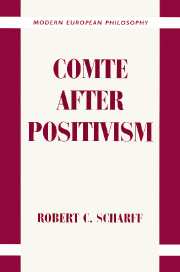Book contents
- Frontmatter
- Contents
- Preface
- Acknowledgments
- Note on Citations
- COMTE AFTER POSITIVISM
- Introduction: Comte for a Post-Positivist World
- Part I Comte Then
- 1 Mill versus Comte on Interior Observation
- 2 Mill versus Comte as Positivist Philosophers of Science
- 3 Comte's Three-Stage Law
- Part II Comte Now
- Bibliography
- Index
1 - Mill versus Comte on Interior Observation
Published online by Cambridge University Press: 06 July 2010
- Frontmatter
- Contents
- Preface
- Acknowledgments
- Note on Citations
- COMTE AFTER POSITIVISM
- Introduction: Comte for a Post-Positivist World
- Part I Comte Then
- 1 Mill versus Comte on Interior Observation
- 2 Mill versus Comte as Positivist Philosophers of Science
- 3 Comte's Three-Stage Law
- Part II Comte Now
- Bibliography
- Index
Summary
Viewed from the present, “introspection” is definitely a phenomenon with an official history. We are given to understand that this procedure has a checkered past and presumably also a questionable future. We remember that it used to be regarded as having scientific credentials, that James and Titchener and Wundt and Brentano all defended versions of it, and that it was once actually regarded as a unique source of information about the human mind. Mill, too, already thought of introspection in this now familiar way; and it is the scientific promise of introspection that he is defending in his famous and influential attack on Comte's alleged refutation of it.
Introspection itself, however, whether in Mill's case or afterward, is not my topic here. Moreover, as I explained in the Introduction, one should initially avoid even using the term when discussing Mill's attack on Comte because Mill fundamentally misunderstands both what Comte wants to refute and why. Comte's villain is something he calls “observation intérieure,” which he thinks of as a spurious metaphysical procedure modeled after Descartes' “meditation”; but what Mill accuses him of attacking is the empirical-psychological operation we now call introspection. Ultimately, I want to show that this little episode of misunderstanding points in the direction of much deeper philosophical issues; but first, we must establish what it is that Comte rejects, what his arguments against it are, and how Mill reacts to them.
Information
- Type
- Chapter
- Information
- Comte after Positivism , pp. 19 - 44Publisher: Cambridge University PressPrint publication year: 1995
